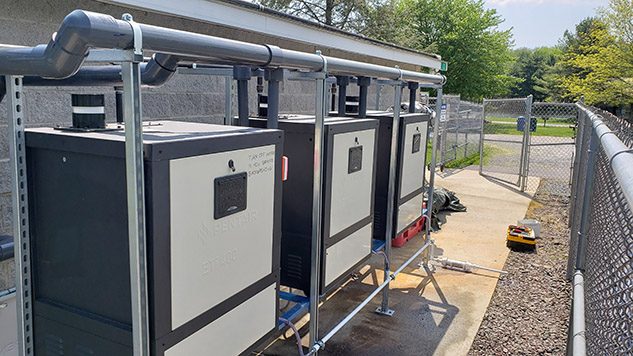Don’t Forget the Pool Heater
Pool heaters are classified as boilers or water heaters and require the same skillset as gas-fired heating systems.

Last month, I wrote about the need to be proactive about boiler replacements during the shoulder season (http://bit.ly/3o77dD0). The weeks or months between heating and air-conditioning seasons are a fantastic time to tackle boiler retrofits. However, if your company services and installs boilers and you’re not doing the same for gas-fired pool heaters, you may be leaving a lot of money on the table.
Pool heaters are classified as boilers or water heaters and require the same skillset as gas-fired heating systems. Another similarity exists between boilers and pool heaters, too. The pool industry has a “Memorial Day rush” — everyone wants to open their pool at the same time.
Much like homeowners and facility managers dealing with their boiler systems, most aquatic facilities, whether residential or commercial, are not proactive about pool heater maintenance.
Boiler technicians have all the tools and licenses, 90 percent of the skills and experience, and most of the parts needed to work on residential and commercial pool heaters. Why not apply those assets in a new (but very similar) market with much less competition?
Our company services and installs boiler and pool heating systems, so we’re well-positioned to draw a comparison. Many of the issues we uncover in our pool heating work are the same ones we find on boiler installations: the gas piping is undersized, the unit is incorrectly sized, flow rates are incorrect, etc. However, the issues are even more prevalent in the pool heating industry.
That’s because the vast majority of pool contractors are excavation and concrete specialists, and the heating system is an afterthought. Many of the problems we encounter simply result from a lack of gas system knowledge in the pool industry.
Now, you might think that adding pool heating services to your repertoire will require you to carry a lot more parts; not entirely true. Yes, there are some specialty, manufacturer-specific parts, but many of the gas components are universal and are already on your service trucks. This includes gas valves, ignitors, flame sensors, pilot assemblies, etc.
Diving In
If you’re interested in pool heating work, there are plenty of ways to get your feet wet. For one, build relationships with local pool contractors. As I mentioned, they’re more focused on dirt work and pouring concrete. Many do not have anyone on staff with a gas license. You can provide that for them and become their go-to gas appliance subcontractor.
In doing so, you’ll be networking with their clients. A residential pool heating job may lead to an outdoor fireplace installation, general plumbing work or HVAC system service and upgrades. A commercial project could yield the same, but on a larger scale. Make a good impression during the pool heating project and introduce yourself to the homeowner or facility manager. We’ve created long-term relationships this way.
Other ways to promote your new work within the pool heating sector include adding a page to your website, expressing to your marketing team that you’d like to expand into this industry and working on your search engine optimization.
You can even reach out to real estate agents: Offer to conduct pool heater repair estimates during the sale of a home and ask them to provide your name to the buyer.
You can even contact the manufacturer of your area’s most popular pool heater brands. Many manufacturers are looking for service providers to whom they can refer work. Become known as the company that really fixes issues and they’ll send you more work than you can handle.
To put it in perspective, the United States has more than 400,000 commercial pools and more than 10 million residential pools.
Contact homeowner associations, country clubs and aquatic facilities in your area. Those can yield immediate commercial work, and the networking benefit can quickly provide residential customers.
Be sure you tap into your existing customer base. Your sales staff and technicians should take every opportunity to let your plumbing and HVAC customers who own backyard pools know that you now offer pool heating services. If they have a heater in place, you can service it. If their heater is aging, you can replace it, and if they want to extend their swimming season by a few months, you can add a heater.
Finally, speak with inspectors. Ask them what they look for in pool heating installations. Take notes and make sure to conduct your work with great attention to detail. Once they know the quality of the work, they can be a great resource for advice and lead generation.
I realize that labor is in short supply and work isn’t. That said, the economy over the next decade is uncertain at best. If and when a time comes that the phone isn’t ringing off the hook, you, your employees and your family will be glad you expanded your horizons.





